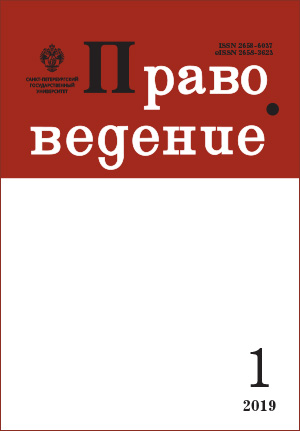Concepts of legal regulation of cross-border tax relations in the digital economy
DOI:
https://doi.org/10.21638/spbu25.2019.108Abstract
The subject of the article is the analysis of alternative concepts of permanent establishment in the era of the digital economy in order to clarify the general and specific features of presented proposals. New trends, along with the potential for tax base erosion and profit shifting, have necessitated the renewal of the international tax system to address the challenges posed by the digital economy’s development. The article analyzes the approaches to the concept of permanent establishment in the digital economy on the examples of the proposals by the Organisation for Economic Co-operation and Development and the European Commission, as well as individual states. The variety of proposals presented is driven by discussions on whether the classical concept of permanent establishment remains the solution for determining the right to tax at source in the digital era. The differences between the proposals on the introduction of the concept of significant economic presence and the traditional concept of permanent establishment are considered. The features of the digitalization of the economy, which play a decisive role for international tax policy, are highlighted. The main characteristic of the digital economy, which is important for tax law, is the absence of the need for the physical presence of companies in a particular state. Meanwhile, it is noted that corporate tax systems are still based on the economic reality of the 1920s, when the current tax systems based on territorial and resident principles were created. As a result, there is a discrepancy between the places of profit creation and taxation. In this regard, the institution of digital permanent establishment is an effective legal tool for the taxation of digital transnational corporations. Based on the results of generalization of the proposals for reforming the concept of permanent establishment, the author defines the general criteria for determining permanent establishment. It is noted that the need to prepare responses to the challenges of the digital economy in the new environment is beyond dispute. The effectiveness of the new rules can be achieved only if the measures implemented in the legislation of as many States as possible are harmonized. Otherwise, it will be impossible to ensure uniform regulation of cross-border tax relations.
Keywords:
tax law, corporate taxation, permanent establishment, profit distribution, digital economy, European Union
Downloads
References
References
Andreev, Nikolay Iu. 2018. Tax sovereignty and digital economy: the digital permanent establishment. Finansovoe pravo 12: 15–18. (In Russian)
Arnold, Brian. 2003. Threshold requirements for taxing business profits under tax treaties. Bulletin for International Fiscal Documentation 10: 476–492.
Arnold, Brian, Sasseville, Jacqes, Zolt, Eric. 2002. Summary of proceedings of an invitational seminar on the taxation of business profits under tax treaties. Bulletin for International Fiscal Documentation 6: 233–245.
Gidirim, Vladimir A. 2017. The basics of international corporate taxation. Moscow, Shapovalov Petrov Publ. (In Russian)
Gustafson, Charles H., Peroni, Robert J., Pugh, Richard Crawford. 2006. Taxation of International Transactions: materials, texts and problems. 3rd ed. Thomson West Publishing.
Hongler, Peter, Pistone, Pasquale. 2015. Blueprints for a New PE Nexus to Tax Business Income in the Era of the Digital Economy. IBFD Working Paper, White Papers IBFD. https://doi:10.2139/ssrn.2591829.
Iarullina, Guzel R. 2016. The place of the institute of permanent establishment in the tax law of the Russian Federation. Aktual’nye problemy rossiiskogo prava 12: 65–72. (In Russian)
Kemmeren, Eric. 2018. Should the Taxation of the Digital Economy Really Be Different? EC Tax Review 27 (2): 72–73.
Khavanova, Inna A. 2017. The virtual and the real: the flow theory in the context of tax regulation. Finansovoe pravo 4: 35–40. (In Russian)
Kofler, Georg, Mayr, Günter, Schlager, Christoph. 2018. Taxation of the Digital Economy: A Pragmatic Approach to Short-Term Measures. European Taxation 58 (4): 123–129.
Konnov, Oleg Iu. 2001 The concept of permanent establishment in tax law: PhD in law thesis. Moscow, IGP RAN Publ. (In Russian)
Kopina, Anna A. 2019. The transformation of the concept of permanent establishment under influence of the new reality of digital economy. Nalogi 1: 41–45. (In Russian)
Kopina, Anna A., Reut, Anna V., Yakushev, Anton O. 2016. International tax law: textbook and practicum for bachelors and masters. Moscow, Iurait Publ. (In Russian).
Kucherov, Il’ia I. 2007. International tax law (academic course): textbook. Moscow, IurInfoR Publ. (In Russian).
Martín Jiménez, Adolfo. 2018. BEPS, the Digital(ized) Economy and the Taxation of Services and Royalties. Intertax 46 (8/9): 620–638.
Petruzzi, Raffaele, Buriak, Svitlana. 2018. Addressing the Tax Challenges of the Digitalization of the Economy — A Possible Answer in the Proper Application of the Transfer Pricing Rules? Bulletin for International Taxation 72 (4a): 91–116.
Rozhdestvenskaia, Tatiana E., Guznova, Elizaveta A. 2017. The Russian and international approaches to the definition of tax residence. Aktual’nye problemy rossiiskogo prava 3: 94–99. (In Russian)
Vikulov, Kirill E. 2011. Rules of taxation of foreign organisations which are functioning through permanent establishment. PhD in law thesis. Moscow, MGIMO Publ. (In Russian)
Downloads
Published
How to Cite
Issue
Section
License
Articles of "Pravovedenie" are open access distributed under the terms of the License Agreement with Saint Petersburg State University, which permits to the authors unrestricted distribution and self-archiving free of charge.




